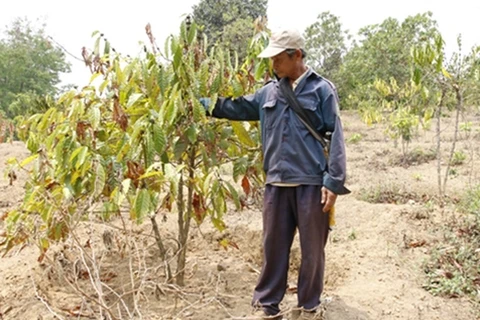Ca Mau (VNA) – The southernmost province of Ca Mau has invested more than 10 billion VND (450,000 USD) on a programme supplying clean water for locals in drought hit areas.
The money was spent on upgrading the water supply system in Ca Mau city and other districts, communes and rural residential areas, as well as drilling 200 wells, providing nearly 2,000 water containers for poor and social welfare families and transporting clean water to people in remote locations.
Despite the efforts, nearly 8,000 households still lack water due to severe drought. Water shortages are affecting Dam Doi, Cai Nuoc, Phu Tan, Nam Can and Ngoc Hien districts.
This week, rain fell across U Minh Ha, Tran Van Thoi and Thoi Binh districts. The drought is forecast to last until June, so it could take more than half a month for Ca Mau to tackle the situation.
Meanwhile, the Mekong Delta province of Soc Trang needs more than 40 billion VND (1.8 million USD) to address drought and saline intrusion.
More than 28,000 hectares of rice and seafood has been damaged. Economic losses were estimated at above 640 billion VND (28.8 million USD), according to the provincial People’s Committee.
Households with rice damaged from 30-70 percent will receive 1 million VND 45 USD per hectare.
Vice Chairman of the provincial People’s Committee in Tran De district Lam Van Be has requested banks support farmers with loans to resume their production.
The drought has damaged 70,155 hectares of crops in the Central Highland province of Dak Lak. Losses amounted to more than 2.1 trillion VND (94.5 million USD).
The province has 600 water reservoirs but over half of these have dried out. More than 35,225 households lack water.
From late April to now, rains have occurred in the province. However, authorities warned people to still seek water resources and use water economically and shift to climate change adaptable crops.-VNA
























